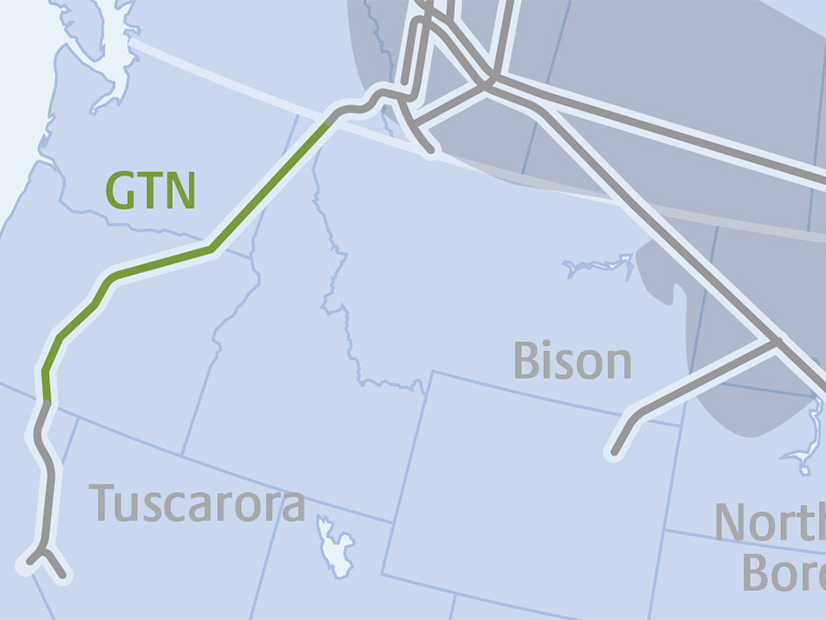
The state of Washington is seeking to stop the extension of the GTN natural gas pipeline.
| TC PipelinesAttorneys general for California, Oregon and Washington asked FERC Monday to deny an application to expand the capacity of a pipeline system that delivers natural gas to the three states.
Their argument: all three states have taken legal measures to trim their methane emissions while the pipeline expansion would increase those same emissions.
Gas Transmission Northwest (GTN) is seeking permission from FERC to expand the capabilities of three compressor stations — Athol Compressor Station in Kootenai County, Idaho; the Starbuck Compressor Station in Walla Walla County, Wash.; and the Kent Compressor Station in Sherman County, Ore. The improvements would add a transmission capacity of 150 million cubic feet per day (CFD) to the pipelines that move gas from Canada to Washington, Oregon and California.
That translates to 3.47 million extra tons of carbon dioxide annually for the next 30 years in those three states, according to the joint filing to FERC by the three states. The project’s budget is $335 million with the costs being passed on to GTN’s current ratepayers. The joint filing contends Houston-based GTN has not guaranteed that new customers will pay for the proposed expansion.
GTN currently delivers up to 2.7 billion CFD in natural gas to customers in in the Northwest and California. The company owns 1,377 miles of pipelines in those three states and Idaho.
“This project undermines Washington state’s efforts to fight climate change,” Washington Attorney General Bob Ferguson said in a news release. “This pipeline is bad for the environment and bad for consumers.”
Ferguson argued that GTN is pitching its proposal to FERC as improvements in reliability to the existing pipeline system when it really wants to expand.
“The West Coast is experiencing very real impacts of climate change and leading the climate fight, so it is fitting that Oregon, Washington and California band together on this joint motion asking FERC to take a hard look at this pipeline proposal,” Oregon Attorney General Ellen Rosenblum said in the same release.
California Attorney General Rob Bonta added: “Expanding the capacity of this pipeline would have significant environmental and public health impacts and is out of step with state and federal climate goals, and FERC can’t honestly say otherwise. The reality is, when we expand gas infrastructure, it’s all too often minority, low-income and Indigenous communities that pay the price.”
GTN provided NetZero Insider with a statement that did not specifically address the complaints laid out by the three attorneys general in their filing.
“Natural gas is a critical component of any strategy to meet our North American energy needs today and in the future and has contributed to reduced greenhouse gas emissions on the continent,” the company said. “The Gas Transmission Northwest XPress Project (GTNXP) is designed to upgrade our system to meet increased demands from our customers in the region, providing the reliable energy to communities throughout the Western U.S. in a safe, responsible, and reliable manner.”
Washington’s legislature passed a law to incrementally trim statewide GHG emissions to 95% of the 1990 level by 2050. By 2045, retail electricity must be 100% emissions-free. In mid-2023, the use of natural gas for HVAC systems in new buildings will be outlawed.
Oregon has required its major investor-owned utilities, Portland General Electric and PacifiCorp, to become 100% renewable by 2040. Those utilities represent 87.8% of greenhouse gasses that electricity suppliers emitted as of 2020, the joint filing said.
California’s targets include reducing the state’s overall GHG emissions to 40% below 1990 levels by 2030 and 80% below that level by 2050.
California and Washington have the nation’s only two cap-and-trade programs to reduce carbon emissions.


